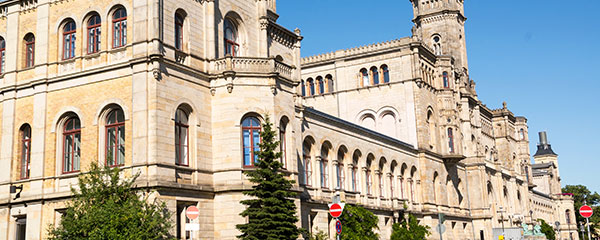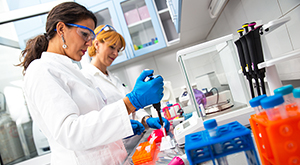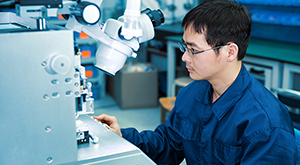Research Institutes in Germany
Germany has a dense network of research institutes and organisations which benefit from major investment in all sectors. As a result, the country's research and academic institutions are among the most innovative and well-equipped in the world. Doctoral students, postdocs and academics will find they are almost spoilt for choice in German research environments.
Here you will find an overview of the types of institutes offering research positions to students, postdocs and academics in Germany:
Universities
Germany has 400 higher education institutions - including over 230 universities of applied science (Fachhochschulen) - offering a broad spectrum of research opportunities. German universities place great emphasis on forging close links between teaching, learning and research and are keen to attract talented international postdocs. Sixteen German universities are ranked in the world’s top 250, the most prestigious being the Technische Universität München and Ruprecht-Karls-Universität Heidelberg. Germany is also home to the TU9 group of nine elite technical universities, considered to be world leaders in research.
More than 97,000 of Germany’s 360,000 overall research staff work within the higher education sector. The country’s gross domestic expenditure on HE research is an average €14.3billion and research positions at universities represent a significant proportion of postdoctoral career opportunities in Germany.
You can find out more information on the research priorities of individual universities at the German Rectors’ Conference research map.
Non-university research organisations
Germany is home to a vast range of internationally renowned non-university research institutes, offering diverse research emphases and exciting job opportunities for both PhD and postdoctoral applicants. The most well-recognised are:
- The Max Planck Society (MPG): Founded in 1948, The Max Planck Society is an independent non-profit organisation which operates 83 research institutes and employs nearly 6,000 researchers. Max Planck Institutes undertake basic research in the natural sciences, bio-sciences, social sciences and humanities. The Max Planck Society also collaborates with universities worldwide to fund research through its Max Planck International Research Schools which offer a large range of postdoc opportunities. The IMPRS has a centralised application process, so your proposal will be seen by all the different institutes within the MPG.
Budget: €2.1 billion.
- Fraunhofer Society: Fraunhofer is engaged in applied research and is the largest organisation of its kind in the EU. Its projects are commissioned by industry and service providers as well as state-run institutions. Some 24,000 members of staff are employed in around 67 Fraunhofer institutes throughout Germany. Fraunhofer supports offices in Europe, the USA, Asia, and the Middle East.
Budget: €2 billion.
- Leibniz Association: A funding and research organisation connecting 89 independent research institutes, covering a broad range of disciplines extending from the humanities and economics through to mathematics. Leibniz focuses on applied research and has a staff of more than 18,000.
Budget: €1.64 billion.
- Helmholtz Association: Carries out top-level research to identify challenges faced by society, science and the economy. Research is undertaken within 18 scientific, technical and medical research centres and is split into six key areas: Energy; Earth and Environment; Health; Technology; Matter; Aeronautics, Space and Transport. The Helmholtz Association has 38,000 employees.
Budget: €4 billion.
- The Alexander von Humboldt Foundation: Although not a research institute in itself, the elite Alexander von Humboldt Foundation promotes academic collaboration between foreign and German researchers through its funding initiatives. Each year the foundation enables 1,900 international researchers to spend time working in Germany and maintains a worldwide network of some 26,000 ‘Humboldtians’ from all disciplines in 140 countries – including 51 Nobel Prize winners.
Budget: €111 million.
The Union of German Academies of Science and Humanities
The union comprises a group of eight German Academies of Science and Humanities, whose 1,900 scholars collaborate on a broad range of subjects. The academies are committed to promoting scientific exchange both in Germany and abroad and to supporting young researchers. Find more information about the eight member academies and their research programmes.
Federal and Länder (State) Research Institutions
Germany has over 200 research institutes operated and funded at Federal and Länder (State) level, which are dedicated to research in all areas of interest to each municipality of Germany. The network consists of 40 Federal Research and Development institutions and 160 Länder institutions, with over 14,000 employed researchers.
Companies and Industrial Research
Companies and private sector organisations account for over two thirds of all research and development spending in Germany. The bulk of research spending in the German private sector is in the automotive, chemical, pharmaceutical and engineering industries. However, the private sector offers a multitude of career opportunities for postdocs across the board, with an emphasis on applied research. German companies and industry work closely with universities and non-university research foundations to commission research projects, promote technology transfer and develop their own dual scholarship programmes and internships.
Generous salary packages and fast-paced career advancement make German companies particularly attractive to talented postdocs. The companies who invest most heavily in research activities are: Volkswagen, Daimler, BMW, Bosch, Siemens, Bayer and BASF. The industry-driven research organisation, the German Federation of Industrial Research Association (AiF) promotes applied research in small and medium-sized German companies and also gives information about jobs and funding.
Networks and Clusters
In recent years the German Federal Government has established a number of networks and clusters - research groups which are dedicated to investigating new technologies. Networks and clusters comprise regional groups of universities, non-university institutes, government bodies and businesses. The German Federal Ministry for Economic Affairs and Energy has recently initiated the ‘go-cluster’ programme which combines national cluster management organisations. For more information about German networks and clusters visit the Clusterplattform Deutschland.
Helpful Links
- German Academic Exchange Service (DAAD): The largest funding organisation for exchanges of students and academics in the world. It has a global network comprising 71 regional offices and information centres.
- Leopoldina: The oldest academy of sciences in the world, the Leopoldina in Halle, has 1,500 members.
- Alumniportal Deutschland: An online network of people who have studied, done research or worked in Germany from all over the world.
- German Rectors’ Conference Higher Education Compass (Hochschulkompass): A voluntary association offering information about research interests and higher education institutions.
Max Saved Jobs Reached
A maximum of 500 Saved Jobs can be created against your account. Please remove an existing Saved Job in order to add a new Saved Job.
Manage Saved Jobs









